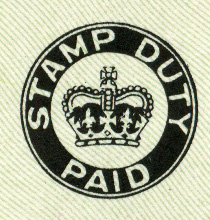December 18th, 2014.
Stamp Duty Changes: How Will You Be Affected?

As of December 4th 2014 stamp duty taxes on property purchases were reformed and recalculated, but how is this done, and how will it affect you? Let’s take a look at the changes in more detail.
How is Stamp Duty Changing?
For those of you who do not know: Stamp duty is a tax paid on all land or property purchased over a certain price threshold. And as of the beginning of December, it is now calculated in a similar way to income tax, as a proportion of the total value, a price that will fall between designated bands.
In the Autumn Statement to the Commons, George Osborne announced that there will be a reform. No longer would stamp duty rise at certain price levels, but it would increase at a graduated rate. This new amount will be calculated on only the amount that falls within the band.
This new system will be applied throughout the UK, however it will change for Scotland in April when the Scottish parliament’s own reforms come in. These will be largely the same, but will have different barriers.
How Will I Be Affected?
Well, thanks to these changes it is estimated 98% of people who pay stamp duty will be better off, and it is hoped this will create a small yet steady increase in property values up to £937,500 and a small decrease in the price of properties above this. There are dramatic savings to be had, however some peoples’ bills may increase too.
If you are a buy-to-let investor then you are likely to benefit from these changes, as it is unlikely that you will purchase a property above the £925,000 threshold, when quantity means more profits.
If you are currently in the process of purchasing a property don’t worry. You have the option of choosing which regime you adhere to. So with some simple maths you can opt for whichever method that benefits you most.
As before, if you are getting divorced and are selling your property no stamp duty will be charged if part of the value is transferred, and if you receive a property as a gift or in a will you won’t have to pay. You will however if you arrange a house swap.
Be careful not to get caught out when buying property, and speak to a financial expert as house prices are rising quickly, yet these stamp duty figures are based on prices staying the same until 2020.
How Will Property Prices Change?
Non-Residential or Mixed-Use Properties:
Property purchase price: Up to £150,000
And
Annual rent: less than £1,000
Stamp Duty: 0
Property purchase price: Up to £150,000
And
Annual rent: £1,000 or more
Stamp Duty: 1%
Property purchase price: £150,000 to £250,000
Stamp Duty: 1%
Property purchase price: £250,000 to £500,000
Stamp Duty: 3%
Property purchase price: Over £500,000
Stamp Duty: 4%
Residential Properties:
Property purchase price: Up to £125,000
Stamp Duty: 0
Property purchase price: £150,000 to £250,000
Stamp Duty: 2%
Property purchase price: £250,000 to £925,000
Stamp Duty: 5%
Property purchase price: £925,000 to £1.5million
Stamp Duty: 10%
Property purchase price: £1.5million or over
Stamp Duty: 12%
These new rules mean that the average family home purchaser will have a saving of £4,500, whereas the average homeowner in London will save £4,900. Even those purchasing the average Help to Buy home will save £650.
What are your thoughts on these changes? Leave us a comment below.





